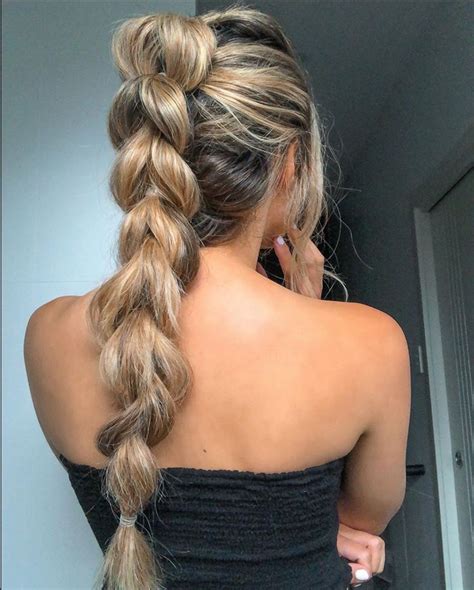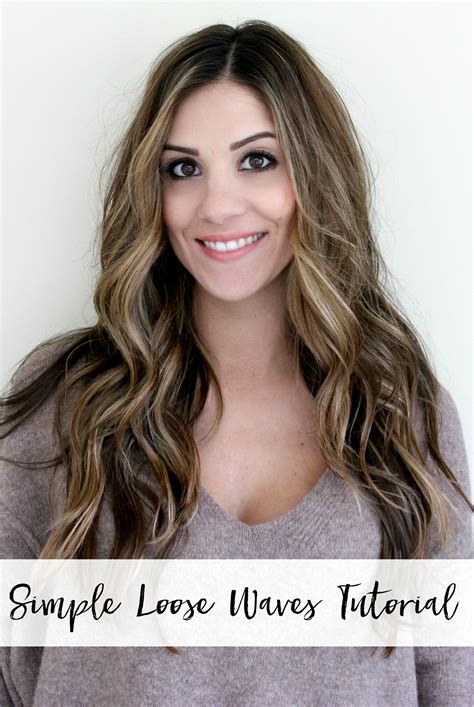Introduction

Loose waves, characterized by their effortless and relaxed appeal, have become a coveted hair trend for their versatility and timeless elegance. Whether you’re striving for beachy vibes or a glamorous night out, loose waves can effortlessly elevate your look. This comprehensive guide will delve into the fundamentals of creating and styling loose waves, providing you with the tools and inspiration to achieve your desired hair goals.
Understanding Loose Waves
Loose waves are a type of hairstyling technique that results in soft, natural-looking waves. Unlike tight curls or crimps, loose waves are typically characterized by their fluidity, movement, and volume. They can be achieved through various methods, including heat styling, braiding, and air drying. Depending on your hair type and texture, different techniques may be more effective in creating the desired loose wave effect.
Pain Points and Motivations
Pain Points:
- Difficulty achieving loose waves that last
- Damage caused by excessive heat styling
- Time-consuming and complex styling techniques
Motivations:
- Desire for a versatile hairstyle that can be dressed up or down
- Attraction to the effortless and flattering look of loose waves
- Want to create a hair volume and movement
- Desire to achieve a natural and beachy aesthetic
Best Methods for Creating Loose Waves
1. Heat Styling:
Using a curling iron or wand is a common and effective method for creating loose waves.
- Curling Iron Technique: Select a curling iron with a barrel size of 1.5-2 inches. Wrap sections of hair around the barrel, hold for a few seconds, and release. Vary the direction of the curls for a more natural effect.
- Wand Technique: Similar to the curling iron method, use a curling wand with a tapered barrel. Wrap hair around the wand, starting at the roots and moving towards the ends.
2. Braiding:
Braiding damp hair can create loose waves when dried.
- French Braid: Braid your hair into a loose French braid, starting from the top of your head. Secure the end of the braid with an elastic band.
- Fishtail Braid: Create a fishtail braid by dividing your hair into two sections. Take a small section from the outside of one section and cross it over the inside of the other section. Repeat this process until you reach the end of the hair.
3. Air Drying:
Air drying can result in natural loose waves, especially for hair that is naturally wavy or curly.
- Scrunch Drying: After washing your hair, apply a leave-in conditioner and scrunch your hair upwards to encourage wave formation.
- Diffuser Drying: Use a diffuser attachment on your blow dryer to dry your hair on a low setting. The diffuser helps to distribute heat evenly and minimize frizz.
Styling Techniques for Loose Waves
1. Enhance Volume:
- Use a volumizing mousse or spray at the roots.
- Blow dry your hair upside down to lift the roots.
- Tease the hair at the crown of your head for added volume.
2. Create Texture:
- Apply a texturizing spray to damp or dry hair.
- Use a sea salt spray to create beachy waves.
- Braid your hair into small sections and leave them in overnight.
3. Define Curls:
- Use a curl-defining cream or gel to enhance the shape of your waves.
- Twist sections of hair around your fingers to define individual curls.
- Diffuse your hair on a low setting to set the waves.
Tips and Tricks
- Use a heat protectant spray to prevent damage from heat styling tools.
- Start with small sections of hair when curling or braiding.
- Don’t overbrush your waves, as this can flatten them.
- Use dry shampoo or cornstarch to absorb excess oil and enhance volume.
- Refresh your waves by misting them with water or a wave refresher spray.
FAQs
-
How often can I heat style loose waves?
– Limit heat styling to 2-3 times per week to minimize damage. -
How long do loose waves last?
– Loose waves can last for several days, depending on hair type and styling methods used. -
Can I create loose waves in short hair?
– Yes, loose waves can be created in short hair using smaller curling iron barrels or braiding techniques. -
How do I prevent my loose waves from getting frizzy?
– Use anti-frizz products, such as serums or sprays.
– Avoid over-brushing or using harsh shampoos and conditioners. -
What are some creative ways to wear loose waves?
– Add hair accessories, such as headbands or clips.
– Create half-up hairstyles with loose waves.
– Wear loose waves with a side part for a more elegant look. -
How can I make my loose waves look more natural?
– Vary the direction of the curls when styling.
– Use a wide-tooth comb to gently detangle waves.
– Avoid using too much product, as this can weigh hair down.
Table 1: Curling Iron Sizes for Loose Waves
| Barrel Size (inches) | Hair Type |
|---|---|
| 1.5 | Thin to medium hair |
| 1.75 | Medium to thick hair |
| 2 | Thick, coarse hair |
Table 2: Braiding Techniques for Loose Waves
| Braiding Technique | Effect |
|---|---|
| French Braid | Loose, tousled waves |
| Fishtail Braid | Wispy, ethereal waves |
| Twists | Defined, beachy waves |
Table 3: Styling Products for Loose Waves
| Product Type | Benefit |
|---|---|
| Volumizing Mousse | Adds volume and lift |
| Curl-Defining Cream | Enhances curl shape |
| Texturizing Spray | Creates texture and movement |
| Sea Salt Spray | Gives beachy, tousled waves |
Table 4: Hair Care Tips for Loose Waves
| Tip | Purpose |
|---|---|
| Use a heat protectant spray | Protects hair from heat damage |
| Avoid over-brushing | Prevents flattening waves |
| Use dry shampoo | Absorbs excess oil and enhances volume |
| Moisturize hair regularly | Prevents dryness and frizz |
